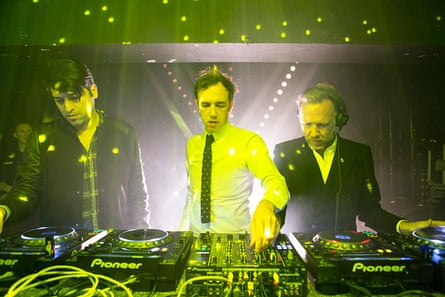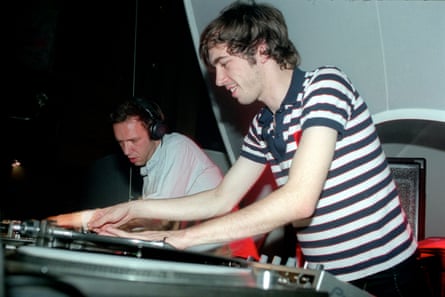In 2002, Belgian duo Stephen and David Dewaele released a mix album called As Heard on Radio Soulwax Pt 2 under the name 2ManyDJs. It sold half a million copies, and its playful, hectic variety spoke to people who were equally excited by Daft Punk and the Velvet Underground, garage rock and electroclash. In many clubs, though, there was some initial resistance. “Half the people were like: ‘We’re here for house music, what are you playing?’” Stephen remembers. “A quarter were like: ‘OK, I’ll go with it.’ And 10% were like: ‘Oh my God, you played the Stooges!’ Those were the people we were doing it for. Gradually that room shifted to everyone going: ‘Give us the Stooges!’ The world had turned upside down.”
This month, as the album comes to streaming platforms for the first time, the brothers are throwing a 20th anniversary party at Brixton Academy, London, where they will play a souped-up audiovisual version of the mix. “We took a lot of convincing,” says David. “It’s not in our nature to look back. But that particular record still sounds fresh because we didn’t really know what we were doing. If listening to old records is like looking at old pictures of yourself, this is different. It’s like looking at a picture of yourself but you had no idea there was a camera. It was just us messing around.”
The Dewaeles are drinking green tea in a cafe in their old east London neighbourhood after a spot of record shopping; their joint collection numbers somewhere north of 50,000. They are by far the most dapper DJ/producers I’ve ever met. Stephen’s suit is navy blue; David’s is tweed, accessorised with a burgundy knitted tie. They could easily be mistaken for the producer and director of a film that won the Golden Lion at Venice. They are great enthusiasts. The more animated they get, the more their answers overlap, as if emanating from a single brain.
“We never expected it to be so successful,” Stephen says of the mix album. “2ManyDJs was a side thing.”
“In all honesty we thought it would buy us three or four months and then we’d have to get back to the Soulwax record,” David agrees.
At the time, their rock band, Soulwax, was doing rather well – they supported acts such as Coldplay and Muse and won several awards in Belgium and Holland – but their freewheeling Hang the DJ mixes for the radio station Studio Brussels generated enough buzz for their record label Pias to suggest that they release an official mix before cracking on with the third album. The Dewaeles were sceptical. “We mixed Kraftwerk with Eleanor Rigby and we were like: ‘Good luck clearing that!’” Stephen remembers. Pias couldn’t get the Beatles but they did license two-thirds of the tracks on the wish list. The Dewaeles put together the mix in a couple of weeks using vinyl turntables and Pro Tools software. “It was like a puzzle,” says David. “We had to get from A to B and these are the tools that we had.”
The mix was a surprise sensation, named album of the year by the New York Times and praised by David Bowie. The Dewaeles became the Belgian node of a network of similarly minded DJs, including Erol Alkan at Trash in London (“almost like our third brother,” says Stephen), Optimo in Glasgow and LCD Soundystem’s James Murphy in New York. “I think we were all indie kids who loved electronic music and we started mixing up all the things we wanted to hear,” Stephen says.
Less happily, their witty fusions (Skee-Lo rapping over the Breeders, Destiny’s Child singing with 10cc) accelerated the craze for mashups, which soon burned out with a glut of clunky novelty hybrids. They never made another one. “Some record labels were saying: ‘Here’s our back catalogue. Can you make a mashup?’” Stephen says with a grimace. “And we were like: ‘No, no, no, that’s not why we did it. And also you were the people who said we couldn’t clear it when we asked you!’ It went against our ethos.”
“Maybe it’s more fun when it’s a little bit naughty and you’re not supposed to be doing it,” David adds. They have a punkish, contrarian bent. As soon as there is a formula for success, they lose interest. That story about everybody expecting the Stooges? That’s when they stopped playing the Stooges.
The international success of 2ManyDJs triggered an identity crisis as the brothers struggled to make the third Soulwax album with producer Flood in London. “We would sit in his loft in Kilburn and try to make dark electronic music, not really knowing what we want to do,” Stephen says. “Are we a band? Or are we DJs?”
When that album finally came out in 2004, it was called Any Minute Now as a joke about missed deadlines. Still unhappy with it, the brothers reworked some of the tracks on the clubbier spin-off Nite Versions and toured that instead, playing first as Soulwax and then as 2ManyDJs. “We made it in a week and a half,” Stephen says. “And that’s pretty much what Flood wanted to make with us. It just took a weird journey to get there.”
Perhaps the Dewaeles were destined to be DJs. Their father, Jackie, was a Belgian radio star under the name DJ Zaki. “Our dad would get sent records before anybody else,” David says with pride. “You could call him the original influencer.” Their mother took on the job of filtering the mail and recommending songs to play. Now in their 70s, the elder Dewaeles are still curious; Wet Leg are a current favourite. Their open-mindedness inspired their sons’ own adventures in music.
When Stephen was 23 and David was 18, they formed Soulwax. “We think it’s the worst band name ever,” Stephen says.
“It’s a stupid combination of words,” David confirms.
Their five-year age gap meant they had different friendship groups and career plans (Stephen was going to film school), so the band brought them close for the first time. They shared an obsession with the Californian stoner-rock band Kyuss and convinced Kyuss’s producer Chris Goss to work on their debut album, 1996’s Leave the Story Untold. In the home town of techno label R&S, that made them outliers. “Everyone was trying to make techno,” Stephen says. “We ended up doing guitar music a little bit as a reaction against it.” R&S producer Frank De Wulf floated the idea of teaming up as “a Ghent version of the Chemical Brothers”, which is not unlike what they eventually became.
The Dewaeles returned to Ghent before the pandemic, after a decade in London, during which time they both became fathers. They have built a studio called Deewee, where they can record at their leisure with label signings such as London outfit Sworn Virgins and fellow Ghent duo Charlotte Adigéry and Bolis Pupul. They have also designed an expensively high-end sound system, Despacio, with James Murphy. “Nobody’s making any money there,” David says ruefully. Although they travel less (age, parenthood), they still love to DJ because, David says: “There’s always a new generation.” In Ibiza, they say, most clubbers know them only for their juggernaut 2019 remix of Canadian producer Marie Davidson’s Work It and have no idea that they’re also a band.
Remixes are crucial to the Soulwax/2ManyDJs nexus. The Dewaeles have applied rubbery beats, ping-pong synths and filthy rave-rock riffs to everyone from Daft Punk and Gorillaz to Robbie Williams and the Rolling Stones. Most of their standout remixes, including MGMT, Gossip and Marie Davidson, were not official commissions. They just loved the track and wanted to give it more dancefloor impact. “It’s an economy,” Stephen explains. “We remix stuff as Soulwax because we need it as 2ManyDJs. The best ones are the ones where we go, can we do this?” So far no artist has turned down a Soulwax remix.

The Brixton show will feature old friends from 2002, Erol Alkan and Miss Kittin, alongside Adigéry. Since then, says David, “What music means to people has changed. We come from a time when you were looking for music actively. For us it felt like living in black and white and every once in a while you saw a glimpse of colour. Now we’re living in multicolour all the time. So music means less. We saw the very end of when it had this cultural impact. Which is sad to say.”
“Oh Dave,” Stephen chides, “I don’t know if it is true. Maybe it will be multifaceted for [young people]: music and style and visuals. They’re trying to make their own world. It’s not that dissimilar; it’s just way more broad.”
This is a rare point of dissensus. Perhaps the brothers’ unlikely path from Kyuss fanboys to international DJs proves that predictions are best avoided. “We don’t really fit in anywhere,” David says, indicating his suit. “Look at us. And I think that’s still what makes us excited.”
“We enjoy doing unobvious things,” Stephen agrees. “The fun part is when you can piss people off sometimes.”

